On Learning and Service: Cellestine’s AMIGOS Story
Earlier this year, AMIGOS alum Cellestine contacted us because she created a workshop about cultural humility inspired by her experience in Nicaragua with AMIGOS last summer.
In her words, “I have loved the leadership training I have received both [at my school] and through AMIGOS and thought that it was important to add the aspect of cultural humility to the leadership programming at Culver. After creating the workshop, I presented it to the faculty and staff on the leadership curriculum team for implementation in the leadership training for next year. I am thrilled to say that they were not only impressed but also very excited to include it within the training!”
Inspired by her initiative and dedication to service, we reached out to Cellestine to chat about the process of creating the workshop, her AMIGOS experience, her future plans, and how young people can make an impact on the world. See the full interview below!
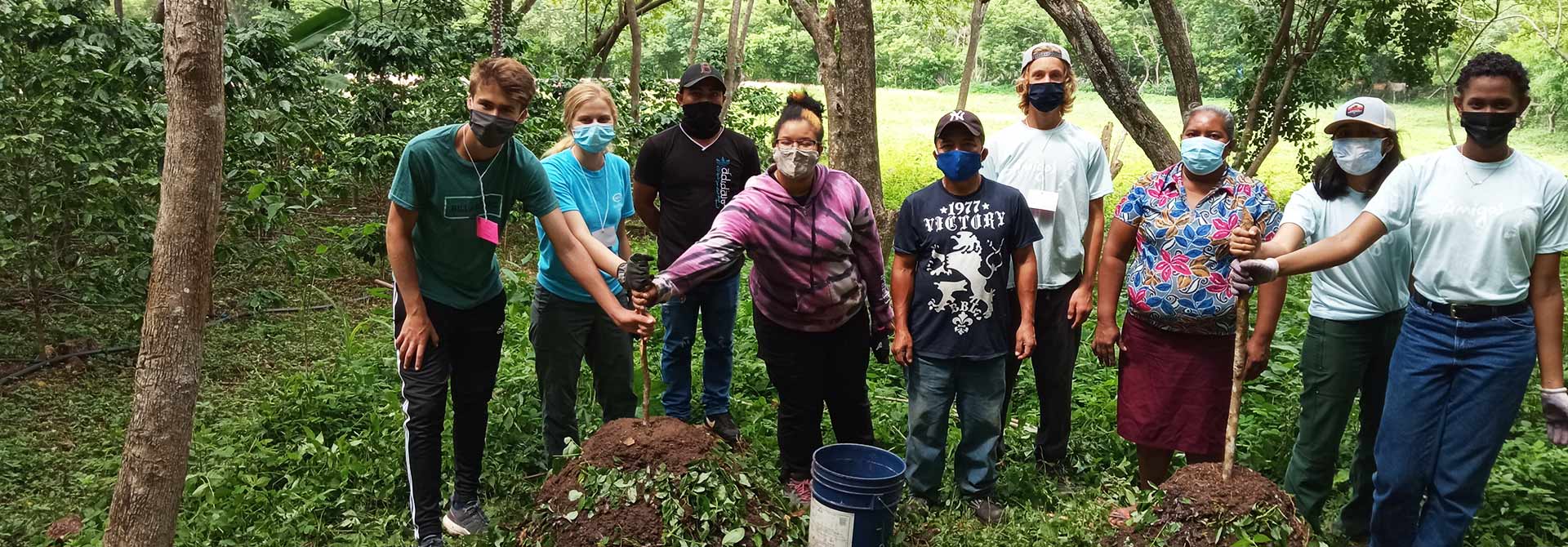 AMIGOS:
AMIGOS:
Can you first tell us how you heard about AMIGOS and why you decided to join?
Cellestine:
I received a scholarship through my school to go abroad between my junior and senior years of high school. I was looking online for different programs and I came across AMIGOS and it turned out that the family friend had also joined AMIGOS a couple of years prior. After talking to her and looking at the website, it just seemed like the perfect fit even though with COVID, I wasn’t necessarily going to live with a host family, but it was still interacting with communities and focusing on cultural development and community service, which I really am passionate about.
AMIGOS:
There are a lot of different programs to go abroad and volunteer. What was the reason that you chose this one?
Cellestine:
As we know, a lot of the programs were also completely shut down and it was really great to see that AMIGOS was still going on. AMIGOS is very focused and has a lot of experience with student groups, whereas a lot of the other ones were geared toward adults or all ages. I liked knowing that I would be working with high schoolers with teenagers, or even younger groups. I could tell that the community development was there, that the focus on understanding how to interact with teenagers was there, which was really important to me. And I could also just through the website and by talking to people could tell that they cared about our development as well, and not just what we were doing to serve the community which was also very important to me. AMIGOS just stood out in a number of ways and it also had a Spanish-speaking program which was the target language I was aiming for.
AMIGOS:
Tell me about your experience in Nicaragua. What was it like getting there? What were you thinking when you got there?
Cellestine:
I didn’t really know what to expect when I got there, because I was originally looking at host family programs before COVID stopped everything. I was a little nervous that there would be 20 teenagers that I’d never met before and none of us had really been interacting with other teenagers for a long time because of COVID. I also was not sure how much my Spanish would improve because I was with a group I wasn’t immersed fully into a community. But then I found out that there were two local students from Nicaragua that would be joining us and I was very excited about that.
When I got to the airport in Florida, before we got to Nicaragua, I met most of [the group], which was really fun because we got to fly together. We already kind of knew each other a little bit so it wasn’t awkward in a foreign country. We finally landed in Nicaragua, and then for the first week, we really got to know each other before we went out into the community. We were quarantined for about 10 days together, but we were still learning Spanish lessons while going through leadership and community service workshops. And we also got to interact and we had a lot of downtime with each other.
We really grew in a tight community, and we realized we had a lot of common goals and values regardless of our different backgrounds which is really cool to see. And then the following week when we went to serve—that’s where the idea of incorporating a cultural humility workshop into my school’s curriculum— because that was a completely new idea to me. The high school that I go to is heavily focused on leadership: we have leadership time built in and leadership positions and committees which is a big part of our school, but I always had the idea that leadership was kind of to save a community and that we would be helping them more. But when I got there to serve, my whole idea and perspective was completely flipped. I realized I would be learning a lot more than I would be giving them because they’ve been doing it for a while and I had just gotten there.
I realized that everyone in the community had a sense of cultural humility as well, because they understood that they didn’t know everything. They’re all working together towards a common goal, which really stood out to me, it was very evident. I felt that [the cultural humility workshop] was something that I should bring to my school because the idea that we’re going to serve people in what they need is not necessarily going to save them, but having the mindest of going there to be a servant instead of leading them through something that may not work at all is really important when you’re serving and leading.
But when I got there to serve, my whole idea and perspective was completely flipped. I realized I would be learning a lot more than I would be giving them because they’ve been doing it for a while and I had just gotten there.
AMIGOS:
I’m curious, I want to come back to the project that you worked on around the cultural humility workshop, but as far as the activities you did in Nicaragua, was there anything that really stood out?
Cellestine:
There was one activity where we had to write about our privileges, disadvantages, where we came from, and our backgrounds. That really opened my mind to how diverse our group was, even though we’re all from the same country, we all came from different backgrounds and that’s not something you see when you just meet a person. You don’t really know where they came from, or what their family life is like. It’s quick and easy to make assumptions about a person, especially if you don’t know those things. It just opened my mind because I have no idea what the lives of the other students around me are like, yes, we’re from the same country, but that’s really it.
I understand that my background and my life story might be completely different from someone else who builds their own views and their own perspectives. And it’s not really fair to judge them based on a few hours of knowing them. That was a really cool activity that I think opened everyone’s minds and helped us grow closer as a group because we finally began to understand each other better and listen to each other’s ideas more.
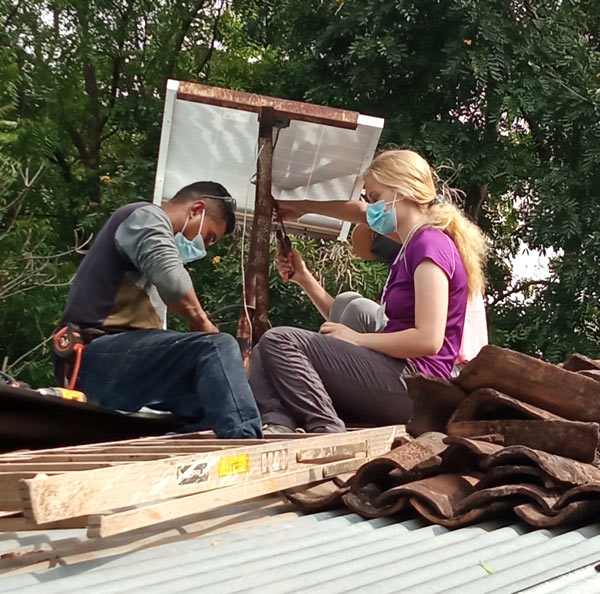 AMIGOS:
AMIGOS:
What is your view on community service and how has it changed?
Cellestine:
I’ve been doing a service project for several years at home. I play the harp, so I play in different restaurants or local businesses and anything I earned, I would donate to an organization nearby. I felt like I was doing something incredible. It’s good to be helping a community, but I always thought I was saving these little kids because the money went to starving children, and I would hear stories about the impact that the food had on them. My idea of service and leadership made me question whether what I’m doing is actually helping, since the presumption is that they aren’t able to help themselves. Maybe when you’re talking about a two-year-old, sure that’s true but, but in general, it’s really not.
That’s how AMIGOS changed my idea of service, because the group we worked with in Nicaragua was a self-sustaining group. Most of the employees, if not all of them, are local people sustaining themselves, and working for and growing a community within themselves. They don’t need people from the United States to come and “save” them and “help” them. They’re not helpless. We are not going in and saving a helpless community from destruction. We’re going to provide what we have to offer while still preserving what they have built. And I think that’s the transition that happened. Honestly, the instant we first met our local partner organization in Nicaragua, I was like, whoa, this is not it. Wasn’t what I was expecting at all.
We are not going in and saving a helpless community from destruction. We’re going to provide what we have to offer while still preserving what they have built.
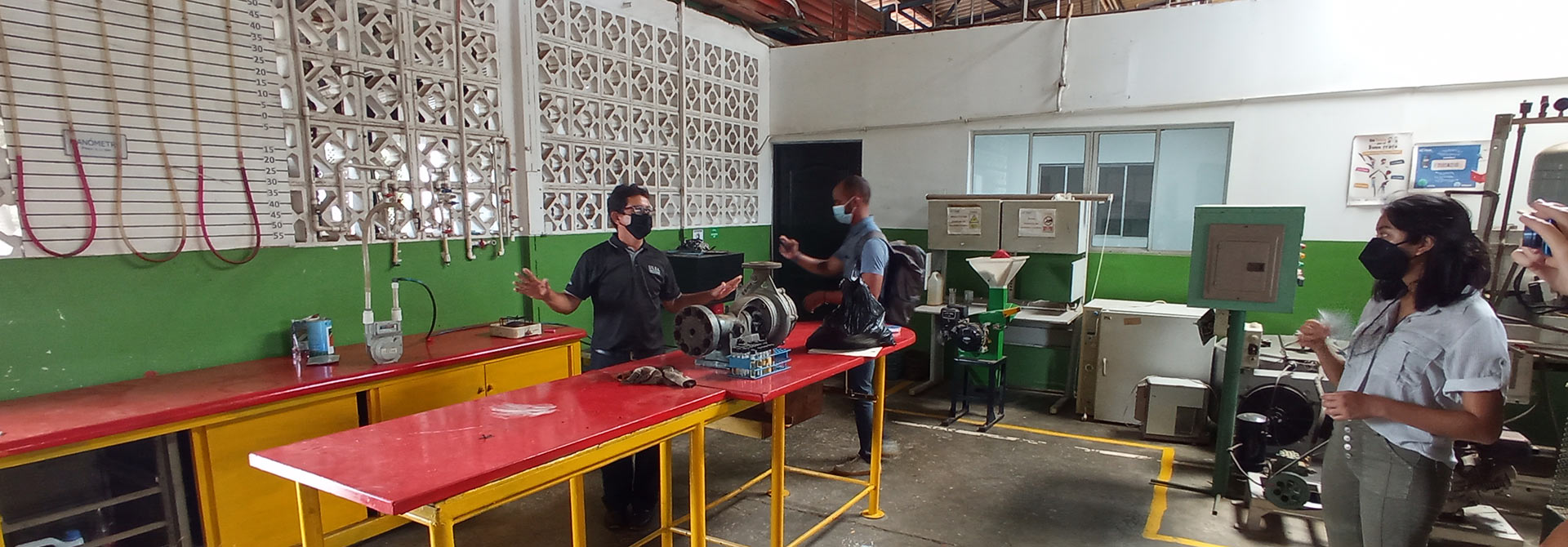 AMIGOS:
AMIGOS:
What are some qualities of doing service, doing community service that makes it ethical versus not?
Cellestine:
It’s easier to find examples of non-ethical service. Looking back at history and colonization, it’s really not ethical. They completely tore apart communities and civilizations, even though they thought they were bettering society and civilizing people. I think what definitely makes service ethical is when you’re preserving the culture and community instead of completely trying to change it and throw it away for something different. Of course, as things grow and develop, they change, but the goal should be to preserve what the people want to preserve, not change it to your own ideas. And that’s kind of the fine line between service and leadership compared to completely changing a society and turning it upside down.
AMIGOS:
What struggles did you encounter during your AMIGOS experience and when you were working on the workshop, and how did you approach and overcome them?
Cellestine:
When I was building my workshop, I really struggled with centering the idea of cultural humility in a local context, because my experience had been international and I can’t just take the whole school to Nicaragua and say, here, this is what I’m talking about. I had to find a way to take what I learned internationally and bring it so that students within a school can learn it without having to travel abroad. It took me a long time—almost a whole year—to figure that out. Once I had that, everything else went pretty quickly. Just working through the details of it, but that was the biggest and the hardest piece of it. I also talked to Lauren a lot.
Lauren was a mentor on my trip, and she gave me access to some of the AMIGOS materials so I could remember some of the workshops that we did in Nicaragua. I didn’t use the exact activities that we did, but I was able to come up with a way to implement them.
It’s quite easy to fall into a trap and think you’re the one “saving” the community and introducing the idea and then taking them out of it so they can experience that, which isn’t right. For me, probably the biggest struggle was building the workshop while simultaneously trying to figure out how to bring something international that I learned into my local community.
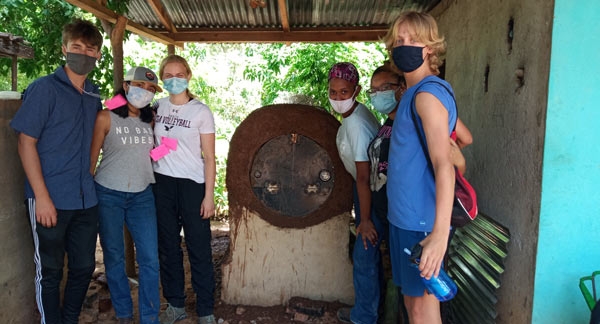 AMIGOS:
AMIGOS:
Can you explain how you figured it out and were able to move forward?
Cellestine:
I started with two TED talks that I absolutely love. The first is The Danger of a Single Story. And then the second one is Want to Help Someone? Shut Up and Listen. I think that is my all-time favorite TED talk, because he goes into a story about how he went to teach Zambians how to grow food, but then a whole bunch of hippos came and ate it. And he asked, “Why didn’t you tell us?” And they said, “You never asked.” That I really love, especially that segment of the TED talk.
The Danger of a Single Story helps me because it builds into cultural humility on how to not stereotype, while understanding that you only know a little bit. And if you think you know everything about a culture, chances are, you probably know one or two things, if not anything. Because of the stories you read, and the people you meet, you start to build a story in your head, but it’s never the full picture. Starting with those two things was very helpful, but The Danger of a Single Story ends up at the beginning of my workshop because that kind of helped me build into the cultural humility. That was the first step that helped me get going for the remainder.
AMIGOS:
Can you tell me about your relationship with Lauren or any other staff members you had while you were in Nicaragua? How exactly did that support manifest for you and other students?
Cellestine:
I would say my biggest supporter was my mentor, Juan Carlos. He is fantastic and he really helped me realize the leadership skills I developed while I was there, and the skills I had before. It was hard for me to identify. He also was the one to keep pushing me to actually get the workshop done. After I left Nicaragua, he would email me and keep checking in on me and it almost came to the point where I didn’t want to disappoint him! He did so much for me while I was there. I want to do this for him almost because he really helped me with my drive and motivation.
Lauren was not my mentor, but she told me right before we left that I could reach out to her for anything. I initially emailed her because she led a lot of the workshops. I think our relationship grew more through email and over Zoom because I didn’t even know how to build a workshop when I started this process. I also didn’t know how to take 80 hours of workshop and leadership material and bring it down to 45 minutes to an hour. I literally didn’t even know where to start. Lauren helped me line up the ultimate goal of the project. What are you going with it? What do you want the takeaway to be? Those two (Juan Carlos and Lauren) have been a huge impact on both the workshop I did and on me through my growth, both in Nicaragua and once I left.
 AMIGOS:
AMIGOS:
You said Juan Carlos helped you see what leadership skills you had and then develop them further. Can you tell me what examples you have of this? I feel like, for a lot of students, “leadership” is kind of nebulous and hard to grasp. Can you tell me what skills you feel like you’d brought to the table and then developed as you were there?
Cellestine:
As I mentioned, my high school is very leadership driven. For three or four years, I had been surrounded by kids who’d been developing the same skills as me. Ultimately, I couldn’t really differentiate myself. When I got to Nicaragua, I was aware that I had grown as a leader, but was still uncertain of exactly what my skill sets were. I didn’t know what I was bringing to the table at all. However, I did receive some feedback from the students and mentors throughout the weekly evaluations, which was helpful.
I began to realize that I was a very effective communicator, which was evident while I was there. Having been the leader of the day twice throughout the trip, gave me insight, I was able to guide the group through different activities without being commanding. When we would talk in group discussions, I was able to lead the discussions in ways that made everyone comfortable. Interestingly enough, I didn’t realize I was even doing those things. Even as I progressed and transitioned from English to Spanish, I too became more comfortable and my previous communication skills allowed me to understand the group and easily adapt.
Juan Carlos and some of the students made me realize that. Towards the end of our last couple of days, we were discussing something we were grateful for. And someone mentioned, “you’re such a great leader!” That just helped me realize that we’d actually grown together. Realizing that I do have leadership skill sets, which was good for my confidence, allowed me to initiate this project. I truly realized I had something to offer even at a school where everyone else has been growing at the same time.
AMIGOS:
Can you tell me what parts of your service project went smoothly and what parts were more difficult?
Cellestine:
I felt like most things went well while I was in Nicaragua—I was so excited that I was there for service and was so engaged in learning and improving my Spanish, that the thought of giving up never really crossed my mind. I did get tired at some points and I got frustrated that my Spanish speaking wasn’t improving as fast as I wanted it to, but in moments where I was pretty much only around the Spanish language, it improved a lot.
When I was back home building the workshop I hit a wall because I didn’t know how to start. Even after meeting with Lauren there, my motivation came in spurts and I would do a little bit and then get stuck and not know what to do.
And at some point, I thought, “it’s just not going to happen. I should just let it go.” But as I got closer to graduating, I realized I would be very, very disappointed if I had just let this slide for so long, so this was my chance to do it. At school, I was in a very good place to be able to introduce the workshop and get it incorporated into the leadership curriculum. Finally was like, “okay, I just need to sit down and do this!” Before you know it, I was able to figure out how to write questions so that people could attain insight into serving a community. I was even able to guide the reader through their solutions, which is kind of what the workshop does.
That was the hardest part honestly, just getting started. And then once I created it, I didn’t know who to take it to at first. I emailed a couple of adults that were on my campus, and I ended up presenting it to the entire leadership curriculum team for the girls’ school and they made an outlet for it. Plus, they could also utilize the curriculum on the boys’ side of the school. It really worked out well, but there were six or seven months where I thought, It’s not going to happen. It’s not going to work. I just need to let it go. But I’m glad that it didn’t!
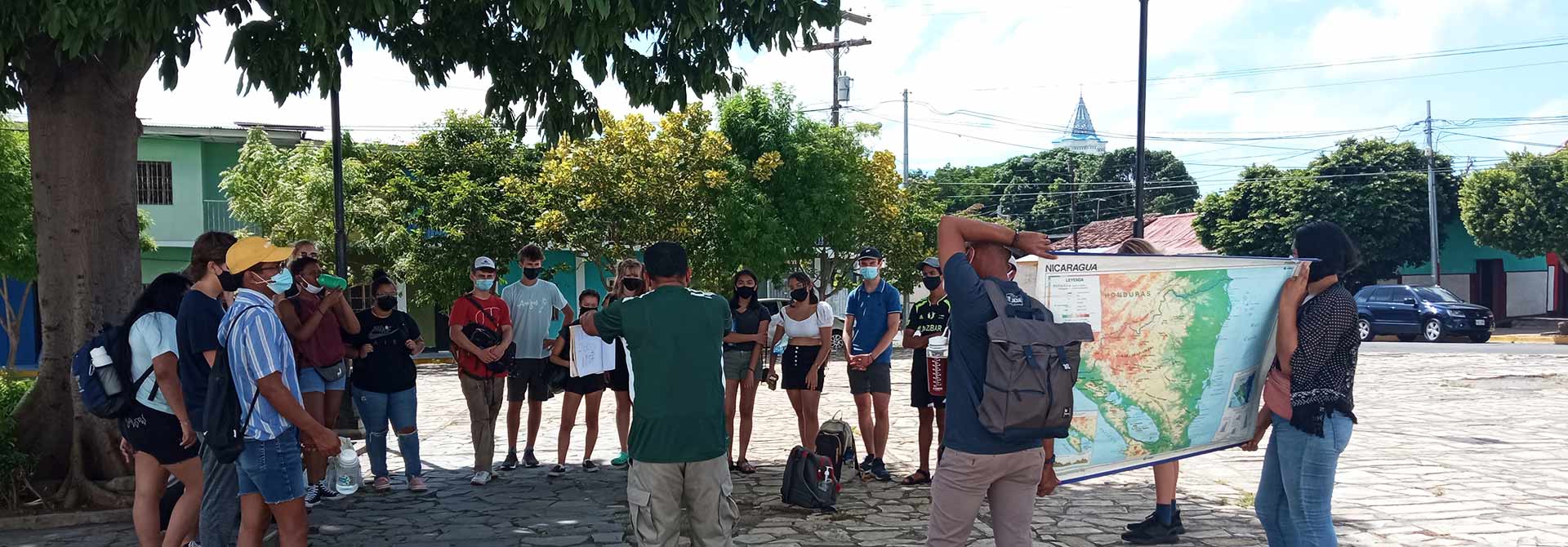 AMIGOS:
AMIGOS:
That’s really impressive! Did you find that your experience with AMIGOS over the summer and throughout the year impacted your future academic or career goals?
Cellestine:
When I left AMIGOS, I was very much like, “I want to dedicate my whole life to service,” because I was so inspired by what I had done and seen. I have been looking into AmeriCorps programs that Lauren mentioned to me (and Ella did as well) as just a way to start working with service. I thought about taking a gap year before I was even applying to colleges, because I really get so much fulfillment from service. I’m going to find ways where I can continue to do that. I love experiencing cultures, I love leadership. I love service. I love feeling like I’m making an impact. And I love being a part of such a larger organization in a larger community that’s helping other communities.
It gives me confidence that the world can improve. And it humbles me because I know it’s not just all me, which is also very inspiring. Just knowing about larger communities working together to try and make an impact. Regardless, I love the idea of being able to create a workshop that can make an impact. Even if it’s in kids within my own school, it doesn’t have to be abroad. These ideas have really grown since my time with AMIGOS. I really hope that can go on an international trip again, maybe even as a mentor going forward. I loved the experience and it took me so long to be able to talk about it just because it was so impactful. I didn’t know how to get the right words across to share how impactful and inspiring it was.
It gives me confidence that the world can improve. And it humbles me because I know it’s not just all me, which is also very inspiring.
AMIGOS:
What are you doing next? What does your future hold?
Cellestine:
I just graduated high school and in the fall, I’m going to the University of Chicago. I’m studying math and economics. Hopefully, my end goal is behavioral economics because I love how human psychology affects economic decisions, and I love where those concepts interact with politics. The combination of stem subjects and politics really inspires me. I’m hoping that I can help influence policy decisions both internationally and within the country to help with global relations that allow people to make better decisions. I think that stems from my passion for service and leadership, because, through a career, I can help make an impact both domestically and internationally. I do hope one day, although this is such a farfetched goal, but I want to be able to start a non-profit, work with AMIGOS, and travel internationally on service and leadership trips. My goal is to continue that growth both domestically and abroad, going forward.
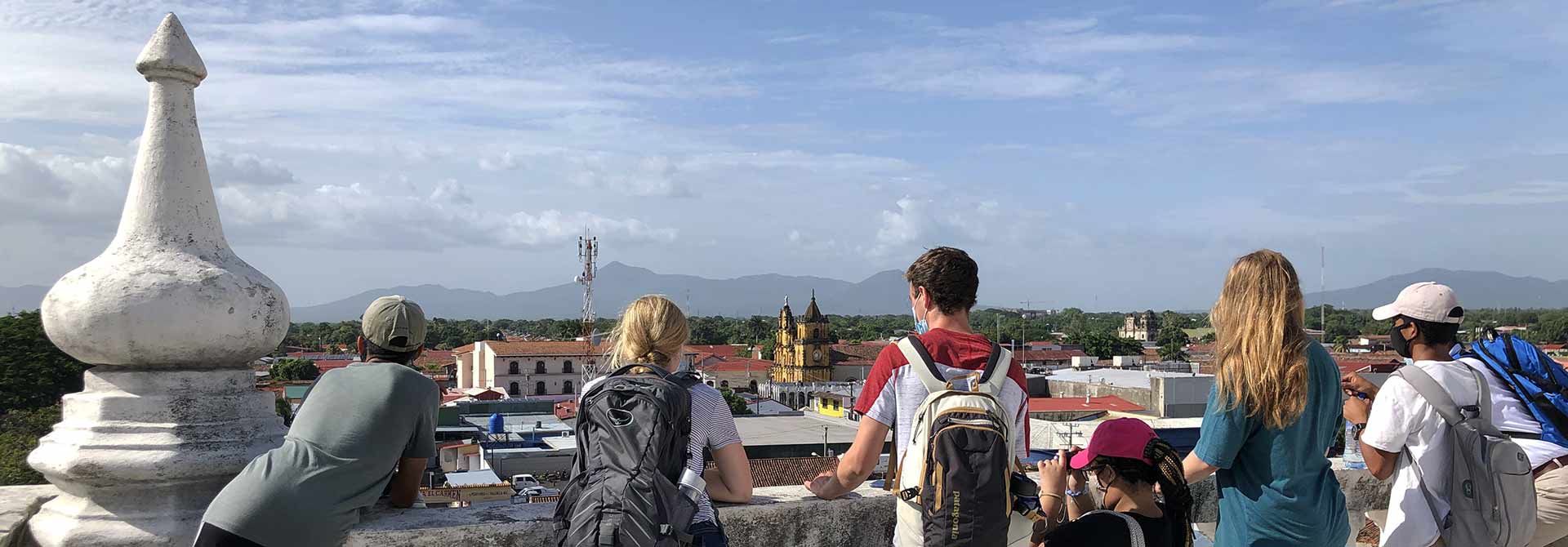 AMIGOS:
AMIGOS:
That’s great. It’s going to be a very exciting future for you. Can you tell me what you think are the most important issues that we’re facing in the world right now? And how do you think young people can work toward addressing these problems? That’s a big question.
Cellestine:
It is a big question. I mean, I think it’s easy to say like hunger or water access, but I think the overarching goal relates to cultural humility. I think the lack of cultural humility and a lack of open-mindedness when countries make decisions, especially when they only want power, doesn’t help anyone. It’s like they’re thinking they’re helping, but it’s only their idea of trying to “civilize” or craft society the way they want. If governments (and students, and people across the country) had a better understanding of cultural humility, it could open more dialogue and civil discourse. I think it could bring communities together through bipartisanship both abroad and domestically to start having those conversations on what needs to be done. Then we can help each other instead of just going in and saying here, this is our money, and this is how we’re going to do it, because that is often the reason why it fails.
That only leads to more turmoil, division, and conflict, and the issues never go away. Once we have that understanding, then we can start focusing on hunger, water access, the lack of resources, and homelessness which are issues that people can easily list off in the world. It needs to start with a conversation and an open dialogue with open-minded people. I think it has to start with the younger generations. Because people don’t often change their minds, so it’s a skill that must be developed. Being open to other ideas allows the development of an understanding of how to have a conversation about why your beliefs are valid. Especially with social media, a lot of both adults and younger students plus teens and kids don’t know how to have those conversations without instantly becoming offended or defending themselves.
AMIGOS:
Is there anything that we didn’t talk about that you wanted to mention, or that you want to discuss?
Cellestine:
No, I think that’s all, but I am really grateful for my AMIGOS experience! I really hope that I can go back at some point and just continue my relationship with AMIGOS!
AMIGOS:
Great! We’d love to have you.

